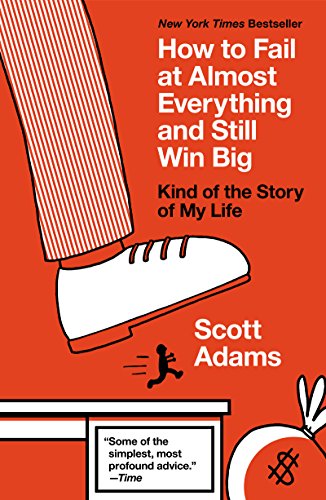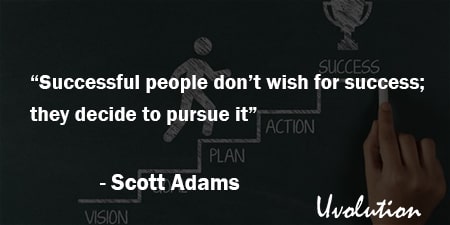How to Fail at Almost Everything and Still Win Big by Scott Adams
The Book in 1 Sentences
“This is the story of one person’s unlikely success within the context of scores of embarrassing failures.” ~ Scott Adams
5 BIG Ideas
1. A goal is a specific objective that you either achieve or don’t sometime in the future. A system is something you do on a regular basis that increases your odds of happiness in the long run.
2. If you want success, figure out the price, then pay it.
3. Having a “routine” makes you more productive… and also happier!
4. The key to build a habit is to do it every single day.
5. “I’m wired to think things will work out well for me no matter how unlikely it might seem.”
How to Fail at Almost Everything and Still Win Big Summary
“When I was in my twenties, I didn’t know anyone who could tell me how to become a cartoonist, how to write a book, or how to be successful in general. This was a big obstacle to my success.
It seemed as if other people were benefiting greatly from the wisdom of their friends and families. That’s exactly the sort of inequality that pisses me off and motivates me at the same time.
As a result, I’ve spent decades trying to figure out what works, and what doesn’t, on the topic of success. If you want to be successful, in just about any field, let me be your starting point.
I’ll describe over the course of this book a sort of template for success that can serve as your launching pad. I won’t always have the right formula for your specific situation, but I can help narrow your choices.”
1. Goals Vs Systems!
“You could word-glue goals and systems together if you chose. All I’m suggesting is that thinking of goals and systems as different concepts has power.
Goal-oriented people exist in a state of continuous presuccess failure at best, and permanent failure at worst if things never work out.
Systems people succeed every time they apply their systems, in the sense that they did what they intended to do.
The goals people are fighting the feeling of discouragement at every turn.
The systems people are feeling good every time they apply their systems. That’s a big difference in terms of maintaining your personal energy in the right direction.
The systems-versus-goals model can be applied to most human endeavors. In the world of dieting, losing twenty pounds is a goal, but eating right is a system. In the exercise realm, running a marathon in under four hours is a goal, but exercising daily is a system. In business, making a million dollars is a goal, but being a serial entrepreneur is a system.
For our purposes, let’s say a goal is a specific objective that you either achieve or don’t sometime in the future. A system is something you do on a regular basis that increases your odds of happiness in the long run.
If you do something every day, it’s a system. If you’re waiting to achieve it someday in the future, it’s a goal.”
Wining every single day Vs. Focusing on something that may or may not happen!
That’s exactly the difference between focusing on your every-day system or focusing on a goal that only exists in the future…
Scott says: “Humans will always think in terms of goals. Our brains are wired that way. But goals make sense only if you also have a system that moves you in the right direction.”
Just focus on your system -your day to day activities- and make your goals happen naturally as a by-product…
That’s it!
2. Don’t Wish! Decide!
“One of the best pieces of advice I’ve ever heard goes something like this: If you want success, figure out the price, then pay it. It sounds trivial and obvious, but if you unpack the idea it has extraordinary power.
I know a lot of people who wish they were rich or famous or otherwise fabulous. They wish they had yachts and servants and castles and they wish they could travel the world in their own private jets. But these are mere wishes.
Few of these wishful people have decided to have any of the things they wish for. It’s a key difference, for once you decide, you take action.
Wishing starts in the mind and generally stays there.
When you decide to be successful in a big way, it means you acknowledge the price and you’re willing to pay it.”
Want something? Pay the price…
Wishing won’t get you anywhere! But taking action WILL…
Scott says that: “Successful people don’t wish for success; they decide to pursue it. And to pursue it effectively, they need a system. Success always has a price, but the reality is the price is negotiable. If you pick the right system, the price will be a lot nearer what you’re willing to pay.
I can’t change the fact that success requires a lot of hard work. But if you learn to appreciate the power of systems over goals, it might lower the price of success just enough to make it worth a go.”
3. Matching Mental State to Activity
“One of the most important tricks for maximizing your productivity involves matching your mental state to the task. For example, when I first wake up, my brain is relaxed and creative.
The thought of writing a comic is fun, and it’s relatively easy because my brain is in exactly the right mode for that task. I know from experience that trying to be creative in the midafternoon is a waste of time.
By 2:00 P.M. all I can do is regurgitate the ideas I’ve seen elsewhere. At 6:00 A.M. I’m a creator, and by 2:00 P.M. I’m a copier.
Everyone is different, but you’ll discover that most writers work either early in the morning or past midnight. That’s when the creative writing juices flow most easily.”
Everyone of us has a different rhythm… It’s really important to know your rhythm to be able to have a masterpiece day!
4. The Power of ROUTINE!
“Barry Schwartz, author of The Paradox of Choice, tells us that people become unhappy if they have too many options in life. The problem with options is that choosing any path can leave you plagued with self-doubt. You quite rationally think that one of the paths not chosen might have worked out better. That can eat you.
Choosing among attractive alternatives can also be exhausting. You want to feel as if you researched and considered all of your options. That’s why I find great comfort in routine.
If you ask me today where I will be at 6:20 A.M. on a Saturday morning in the year 2017, I’ll tell you I will be at my desk finishing the artwork on some comics I drew earlier in the week. That’s what I was doing last Saturday at that time and what I plan to do this Saturday as well. I can’t recall the last time I woke up and looked at my options for what to do first. It’s always the same, at least for the first few hours of my day.”
That’s really powerful!
Having a “routine” makes you more productive… and also happier!
Scott also says: “I never waste a brain cell in the morning trying to figure out what to do when. Compare that with some people you know who spend two hours planning and deciding for every task that takes one hour to complete. I’m happier than those people.”
5. Programming Our ROBOT!
“Your brain is wired to continuously analyze your environment, your thoughts, and your health and to use that information to generate a sensation you call your attitude.
You know from experience that you do better work, and you more enjoy life, when your attitude is good. If you could control your attitude directly, as opposed to letting the environment dictate how you feel on any given day, it would be like a minor superpower. It turns out you have that superpower.
You can control your attitude by manipulating your thoughts, your body, and your environment.
Your attitude affects everything you do in your quest for success and happiness. A positive attitude is an important tool. It’s important to get it right.”
To have a superpower = Control your attitude = By manipulating your thoughts, your body, and your environment
So, how can we do that?
Scott says that: “The best way to manage your attitudes is by understanding your basic nature as a moist robot that can be programmed for happiness if you understand the user interface.”
Scott also says: “Exercise, food, and sleep should be your first buttons to push.”
Exercise, food, and sleep are the fundamentals that we should take good care of.
So, are you exercising every day? What about your nutrition? And how about your rest?
6. To Build a Habit = Every Single Day
“If you want to make a habit of something, the worst thing you can do is pick and choose which days of the week you do it and which ones you don’t.
Exercise becomes a habit when you do it every day without fail. Taking rest days between exercise breaks up the pattern that creates habits. It also makes it too easy to say today is one of your nonexercise days, and maybe tomorrow, too.”
So, the key to build a habit is to do it every single day…
And he talks about his exercise: “I exercise at lunchtime because mornings are better for my creative work and afternoons are unpredictable in terms of work and family time.
Other successful exercisers get up long before the sun to do their workouts. Still others go straight from work to the gym.
In each case the key is to have a predictable system. The method that never succeeds is exercising whenever you have some spare time. If you’re like most adults, you haven’t had spare time in years.”
7. The First Person to….
“Realistically, what were the odds of being the first person on earth to beat a focal dystonia? One in a million? One in ten million? I didn’t care. That person was going to be me. Thanks to my odd life experiences, and odder genes, I’m wired to think things will work out well for me no matter how unlikely it might seem.”
Scott had a medical issue which is called Focal dystonia. He couldn’t draw without painful spasms!
And there was no cure for this issue. So, he decided to be the first person to beat it.
And he did!
Then, he had another medical issue with his voice… His voice stops whenever tries to talk!
““What’s the cure?” I whispered.
“There is none,” she replied.
But that isn’t what I heard. The optimist in me translated the gloomy news as “Scott, you will be the first person in the world to be cured of spasmodic dysphonia.” And I decided that after I cured myself, somehow, someway, I would spread the word to others.
I wouldn’t be satisfied simply escaping from my prison of silence; I was planning to escape, free the other inmates, shoot the warden, and burn down the prison.
Sometimes I get that way.
It’s a surprisingly useful frame of mind.”
WOW! That’s the real superpower!
And remember that “If you think your odds of solving a problem are bad, don’t rule out the possibility that what is really happening is that you are bad at estimating odds.”
That was my QUICK How to Fail at Almost Everything and Still Win Big summary. If you’re interested, get your copy. There is a HUGE amount of wisdom and life-changing ideas in this book, and we’ve only touched on a tiny bit of it.
Buy The Book: How to Fail at Almost Everything and Still Win Big by Scott Adams

GET Blinkist 7 Days FREE Trial
3000+ Book Summaries
(Audio and Text)





